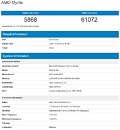Thursday, June 13th 2019

AMD's Upcoming $750 Ryzen 9 3950X (16C, 32T) Shown Beating Intel's $2,000 i9-9980XE (18C, 36T)
When we said AMD was readying a presentation on their Ryzen 9 3950X CPUs to awe crowds at E3, we weren't thinking of something of this magnitude. But apparently, it's true: a Geekbench test result has shown AMD's $750, 16 core, 32 thread Ryzen 9 9 3950X beating Intel's 18 core, 36 thread $2,000 i9-9980XE monster. Now, you may be thinking: ok, it beat it because of AMD's announced 4.7 GHz boost, and did so only on single threaded performance, obviously... but you would be wrong.
The Geekbench scores show AMD's Ryzen 9 3950X delivering 5,868 points in single, and 61,072 points in multicore workloads. Intel's i9-9980XE, on the other hand, scores just 5,391 single core, and 46,876 multicore points (on average and at stock clocks of 3,000 MHz base and 3,400 MHz boost). This is an incredible performance difference (particularly in the multicore score), and was apparently done with an engineering sample for AMD's upcoming chip that didn't even run at its announced 4.3 GHz base and 4.7 GHz boost clocks, but at 3.3 GHz and 4.3 GHz respectively. AMD's 105 W TDP, 16 core chip beats Intel's 185 W TDP, 18 core one... Where has the world come? Take the usual dosage of NaCl, and let's keep things in perspective - even if AMD's Ryzen 9 3950X equals, and doesn't beat, Intel's i9-9980XE, it's still a huge win for the red company. Almost as big a win as that huge stone on Lisa's hand.
Sources:
Tom's Hardware, Intel i9-9980XE GeekBench score example, GeekBench Ryzen 9 3950X test result
The Geekbench scores show AMD's Ryzen 9 3950X delivering 5,868 points in single, and 61,072 points in multicore workloads. Intel's i9-9980XE, on the other hand, scores just 5,391 single core, and 46,876 multicore points (on average and at stock clocks of 3,000 MHz base and 3,400 MHz boost). This is an incredible performance difference (particularly in the multicore score), and was apparently done with an engineering sample for AMD's upcoming chip that didn't even run at its announced 4.3 GHz base and 4.7 GHz boost clocks, but at 3.3 GHz and 4.3 GHz respectively. AMD's 105 W TDP, 16 core chip beats Intel's 185 W TDP, 18 core one... Where has the world come? Take the usual dosage of NaCl, and let's keep things in perspective - even if AMD's Ryzen 9 3950X equals, and doesn't beat, Intel's i9-9980XE, it's still a huge win for the red company. Almost as big a win as that huge stone on Lisa's hand.

70 Comments on AMD's Upcoming $750 Ryzen 9 3950X (16C, 32T) Shown Beating Intel's $2,000 i9-9980XE (18C, 36T)
9980xe = $1999
With the money of a 9980xe alone, you can buy 3950x+ unnecessary high end MB + water loop and still have money for 32GB of RAM
I don't think I am gonna upgrade my X470 :lovetpu:
d*mn you. Please stop...
Im in austin and the local shops here always make fun of what a sh*tshow AMD launches typically are (Ryzen very much included) - it's extra funny considering HQ is down the street. Where the local Fry's had a bunch of chips on hand and no motherboards for 2 weeks after launch.
And let's face it, we've always maintained that those single scores matter a whole lot more than a slightly higher multi,... Intel has nothing on this. Especially if you consider price and the now also relevant damage to HT.
If that's truly the case, it's really unfortunate because I was hoping for great memory overclocks and the additional bandwidth and lower latency that usually comes along with that, not one or the other. Speaking of latency, it doesn't appear that it has been improved at all. I run at 3600 MT/s CL14 with my 2700X and latency is generally around 55-60 ns in Aida64, which is about as good as it seems to get with Ryzen. The same 3600 MT/s CL14 (with closely matched sub-timings) on my 7700K has about 33-38 ns of latency, which is a huge difference. I guess we'll find out for sure in a few weeks.
Like those stupid advertisement for smartphone (at least where I live) that say : octa core bla bla bla
Octacore alone doesn't mean anything. Same goes for CPU core count.
For example, having to disable hyperthreading, which several companies have said is necessary for full security, is a big blow to some of Intel's parts. Some people will respond by saying they're not that worried about security. Well, maybe they aren't but some are and should be.